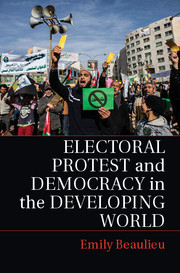Book contents
- Frontmatter
- Dedication
- Contents
- Tables and Figures
- Acknowledgments
- 1 Introduction
- 2 Elite Bargaining and Elections in the Developing World
- 3 Causes of Electoral Protest
- 4 Election Day and Its Aftermath
- 5 Democratic Consequences of Electoral Protest
- 6 Conclusion
- Appendix A Data Description and Robustness Checks
- Appendix B. Boycotts
- Appendix C. Post-Election Mass Demonstrations
- Appendix D. Election-Related Reforms
- References
- Index
- References
2 - Elite Bargaining and Elections in the Developing World
Published online by Cambridge University Press: 05 June 2014
- Frontmatter
- Dedication
- Contents
- Tables and Figures
- Acknowledgments
- 1 Introduction
- 2 Elite Bargaining and Elections in the Developing World
- 3 Causes of Electoral Protest
- 4 Election Day and Its Aftermath
- 5 Democratic Consequences of Electoral Protest
- 6 Conclusion
- Appendix A Data Description and Robustness Checks
- Appendix B. Boycotts
- Appendix C. Post-Election Mass Demonstrations
- Appendix D. Election-Related Reforms
- References
- Index
- References
Summary
After Guyana's president Cheddi Jagan died in 1997, his wife Janet assumed the office for the People's Progressive Party (PPP) and won reelection to the presidency in December of that same year. The opposition People's National Congress (PNC) began protest demonstrations on December 19, the day she was sworn into office, and those protests continued into January. In addition to near-daily street demonstrations, four separate bombing incidents were reported during this time. In two cases the bomb attacks targeted public buildings – a hotel in the capital city of Georgetown and a TV station – and it was unclear who was responsible, though the president blamed opposition supporters in at least one case. The other two incidents clearly targeted incumbent and opposition political actors. One homemade bomb was detonated outside of the home of an influential opposition supporter, and other bombs were found and defused outside of the home of President Jagan.
In mid-January, amid continuing demonstrations, a delegation from the Caribbean Community (CARICOM) arrived to broker a resolution to the month-long political tension. This intervention resulted in a negotiated agreement between the opposition PNC and incumbent PPP to establish a constitutional commission that would make recommendations to reduce political conflict in the country. As part of the agreement, new elections would be held within a year and a half, thereby allowing time to implement the commission's recommended reforms. In the meantime, both parties agreed to an audit process for the previous election, to address opposition concerns about manipulation.
- Type
- Chapter
- Information
- Electoral Protest and Democracy in the Developing World , pp. 25 - 54Publisher: Cambridge University PressPrint publication year: 2014



